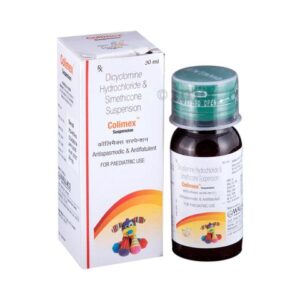ACTIVATED DIMETHICONE + DICYCLOMINE
Activated Dimethicone: Activated Dimethicone, also known as simethicone, is an over-the-counter drug used to relieve symptoms associated with excessive gas in the digestive system. It is commonly used to alleviate discomfort caused by bloating, flatulence, and abdominal pain.
The mechanism of action of Activated Dimethicone is quite simple. It works by dispersing and breaking down gas bubbles in the digestive tract. This helps to reduce the surface tension of the gas, allowing it to be expelled more easily from the body. As a result, it relieves the symptoms of gas and provides relief to the patient.
The recommended dose of Activated Dimethicone varies depending on the age and condition of the patient. For adults and children over the age of 12, the usual dose is 40 to 125 mg taken orally after meals and at bedtime as needed. For children between the ages of 2 and 12, the dose is usually 20 to 40 mg taken orally after meals and at bedtime, or as directed by a healthcare professional.
Activated Dimethicone is considered safe and generally well-tolerated. However, some common side effects that may occur include diarrhea, constipation, stomach cramps, and nausea. These side effects are usually mild and go away on their own. If any severe or persistent side effects occur, it is important to contact a healthcare professional.
It is worth noting that Activated Dimethicone is not a treatment for underlying conditions that cause excessive gas, such as irritable bowel syndrome (IBS) or lactose intolerance. It only provides symptomatic relief from the discomfort associated with excess gas.
It is always recommended to consult a healthcare professional or pharmacist before using Activated Dimethicone to ensure proper usage and to rule out any potential interactions with other medications or medical conditions.
Dicyclomine: Dicyclomine is a medication used to treat symptoms associated with irritable bowel syndrome (IBS), including abdominal pain, cramping, and bloating. It belongs to a class of drugs called anticholinergics, which work by blocking the action of acetylcholine, a neurotransmitter involved in smooth muscle contractions in the digestive system.
The recommended dose of dicyclomine is typically 20 mg to be taken orally four times a day, before or after meals and at bedtime. The dose may be adjusted based on individual response and tolerability.
Common side effects of dicyclomine include dry mouth, blurred vision, dizziness, drowsiness, constipation, difficulty urinating, or a decreased ability to sweat. These side effects are usually mild and temporary. However, in rare cases, more serious side effects such as rapid or irregular heartbeat, difficulty breathing, or severe allergic reactions may occur. It is important to seek medical attention if any of these severe side effects are experienced.
Dicyclomine should be used with caution in individuals with certain medical conditions such as glaucoma, urinary retention, or myasthenia gravis. It may also interact with other medications, so it’s important to inform the healthcare provider of any other medications being taken.
Overall, dicyclomine is an effective medication for the symptomatic relief of IBS, but it should be taken as prescribed by a healthcare professional and any concerns or side effects should be discussed with them.

